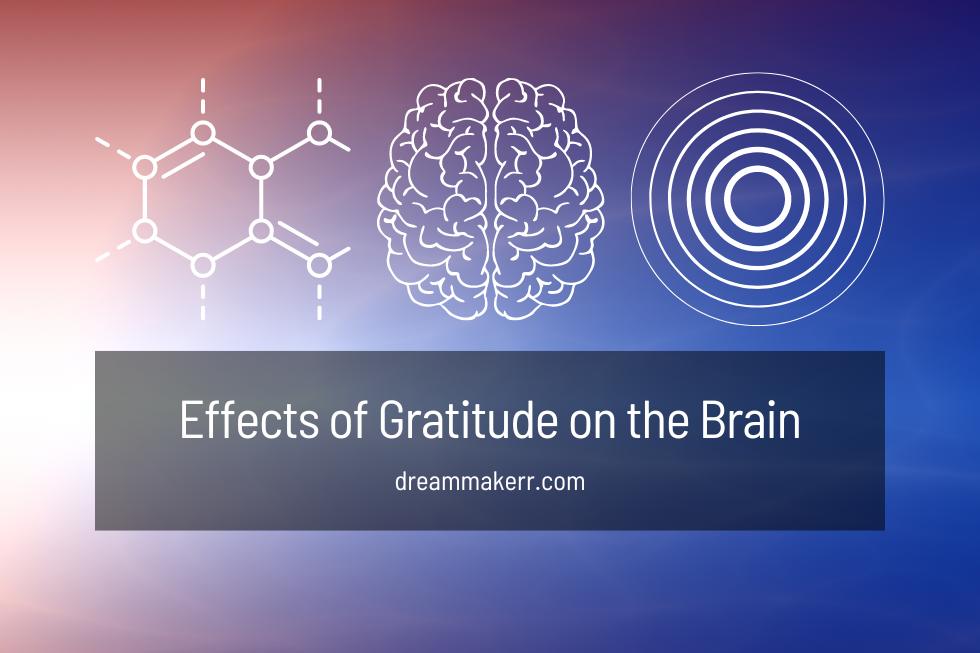On this page

The Positive Effects of Gratitude on the Brain
Did you know that when we feel grateful, our brains release dopamine to help us feel good?
In addition, it changes our focus from the things that are missing in our lives, to being happier about the things we do have.
The more grateful we are, the more things we get to be grateful for.
The many benefits of gratitude and positive effects of gratitude on the brain are becoming more and more well-known.
When this strong emotion is transformed into thoughtful actions, both the giver and the recipient can profit.
Which brings up some questions for us.
- How does being grateful work?
- Effects of gratitude on the brain
- How gratitude changes the brain
- How thankfulness affects the brain
- What are the psychological effects of gratitude on the brain?
This blog post explains how gratitude positively impacts you and the people you care about.
How Does Gratitude Work?

When expressed in many forms, gratitude is linked to joy and contentment. Whether we are giving or receiving it, this is true. The beauty of gratitude lies in precisely that. It is advantageous to all parties concerned. Having an attitude of gratitude is life changing.
There are many ways in which gratitude and happiness are related.
Happiness is the most prominent of the positive emotions that are brought on by expressing gratitude.
- Optimism
- Self-worth
- Empathy
- Selflessness
- Spirituality
are other good feelings.
All of these paths lead to unadulterated joy
Practicing gratitude is not just for those in our immediate vicinity. Even when directed at ourselves, it can perform a miracle. To make our lives simpler and more tolerable, we could all use more self-kindness, forgiveness, and understanding.
Gratitude can cause a cascade of happy feelings that can result in many positive things in life, such as better health, a more robust social network, and higher productivity.
What Are The Effects of Gratitude On The Brain?

Extensive research has undeniably proven the connection between gratitude and the brain.
The part of the brain known as the anterior temporal cortex, which is responsible for processing visual and verbal information to form long term memories also plays a role in our moral judgments when it comes to experiencing feelings of gratitude.
It has been discovered that individuals who feel gratitude have more gray matter in their right inferior temporal gyrus. Because of the neurochemical differences in the Central Nervous System, some people experience gratitude while others do not.
Being grateful can make you feel delighted and content:
- It’s explained physiologically as the release of the neurotransmitters serotonin and dopamine. These two neurotransmitters make us feel good.
- This turn of events has several effects, including lowering fear and anxiety by regulating the stress hormone and promoting positive thinking to restructure our fundamental knowledge.
- Regular gratitude builds new neural connections to feel good emotions like satisfaction and happiness.
A sustained positive and appreciative behavioral pattern can be formed in us through conscious and regular gratitude practice.
Some of the benefits of gratitude on body functions and psychological conditions are:
- Gratitude strengthens the immune system
- Gratitude reduces stress and makes us feel more relaxed
- The act of counting blessings can foster a greater sense of well-being and calm
- Grateful people are less likely to experience anxiety and depression
- Regular gratitude practices can increase our resilience in the face of difficulties and setbacks
- Gratitude improves our sleep quality and overall physical health
- Grateful people are more likely to experience positive emotions and increased levels of happiness
- Gratitude makes us feel more connected to others and builds social bonds
- Expressing gratitude can enhance our career satisfaction and job performance
- Practicing gratitude can lead to a greater sense of life satisfaction and overall well-being
What’s the gratitude effect on the brain?
Numerous studies and analyses have been conducted on this subject and all point in the same direction. Yes, cultivating gratitude causes changes in the way that the brain is wired.
- It has been established beyond a shadow of a doubt that gratitude expressions alter the brain’s neural architecture.
- Positive feelings like happiness and contentment are produced as a result.
- The expression of “feel good” hormones are sparked by practicing gratitude and showing appreciation for others, resulting in a positive outlook and a stronger immune system.
- Numerous studies indicate that practicing gratitude stimulates the brain’s reward system. As a result, our perspectives on the world, the people in it, and ourselves change.
- When we express or receive gratitude, our brain concentrates on the present.
Something we would have otherwise overlooked or forgotten. This puts the focus on the present and encourages mindfulness or present-moment living.
Neurotransmitters like dopamine, serotonin, and norepinephrine are released when our attention shifts to the blessings and the present moment. These are the ones that regulate our feelings, levels of fear, stress, and anxiety. The levels of happiness, motivation, and contentment rise as a result.
Psychological Effects of Gratitude
Recent studies have shown that there is a connection between gratitude and mental health.
It has been widely recognized as beneficial for individuals who are mentally well adjusted.
These studies indicate that practicing gratitude can be helpful for those struggling with health problems..
If it’s so simple why don’t more people embrace it?
Furthermore, when combined with counseling the practice of gratitude has an impact on the recovery and rehabilitation of individuals with psychological conditions.
By shifting our focus from negative to emotions, gratitude offers valuable psychological advantages.
According to recent mental health statistics, issues arise from an individual’s difficulty in letting go of thoughts or breaking away from them.
Negative thoughts tend to breed negativity creating a challenging cycle that is hard to break free from.
However, expressing gratitude allows us to experience emotions, which redirects our attention away from negativity.
When we express appreciation towards others or reflect on our happiness we interrupt the cycle of negative thinking and bring joy to those around us.
After this interruption it becomes harder for the mind to dwell on thoughts alone.In fact this break might be all that our minds need in order to liberate themselves.Studies have shown that expressing gratitude when it remains unspoken or unsent can still have a positive impact on your life.
For example writing a letter of thanks to someone who has helped you but not actually delivering it can still effectively address issues.
It’s important to note that gratitude is not a fix or an instant solution to problems. Its benefits accumulate over time.
Eventually make a noticeable difference.
To fully experience the benefits of appreciation it requires persistence, time and patience.
Although the advantages of gratitude may take some time to materialize they are known to have lasting effects.
Research has documented the impact of gratitude on the brain suggesting that cultivating this attitude makes our brains more receptive to its long term consequences.
As a result gratitude has an enduring psychological influence on our minds.
Conclusion
Expressing gratitude has advantages for our mental well being.
It has the power to uplift our spirits, enhance our ability to handle stress and encourage us to engage in helpful behaviors.
However, it’s important to note that gratitude is not a solution for all problems. Its benefits require time and effort before they fully manifest.
Nevertheless the impact of gratitude is long lasting making it an invaluable tool for enhancing our health.
When we cultivate a sense of gratefulness we experience increased happiness and fulfillment, improved health, stronger interpersonal connections and a more compassionate outlook on the world.
By expressing gratitude both outwardly through simple words and actions we can significantly improve not only our own lives but also the lives of those around us.
By recognizing and appreciating our unique talents and qualities through gratitude we gain greater self understanding and acceptance.
This empowers us to take control of our lives in ways that align with our desires.
Faqs
How does gratitude affect mental health?
Gratitude has been linked with lower levels of anxiety and depression, greater happiness, more resilient coping mechanisms for stress, and improved sleep quality. Furthermore, gratitude may act as a protective factor against developing mental health problems.
What are the benefits of gratitude?
The benefits of gratitude include:
- Increased happiness and life satisfaction.
- Improved physical health.
- Better sleep.
- Decreased anxiety and depression.
Gratitude also helps people to feel more connected and less alone.
How do you express gratitude?
There are many ways to express gratitude. You can say “thank you,” give a hug, write a note, or perform a random act of kindness.
Can gratitude rewire your brain?
Yes, gratitude can rewire your brain for happiness. When you regularly express gratitude, you train your brain to focus on the positive, which can lead to increased happiness and life satisfaction.
What are areas of the brain activated when we practice gratitude?
When we engage in gratitude certain parts of the brain like the hypothalamus, pituitary gland and glands become active. These brain regions play a role in managing stress, metabolism and blood pressure.
By expressing gratitude we stimulate these areas of the brain resulting in heightened feelings of happiness and overall wellness.
What chemical does gratitude release?
Gratitude has beneficial impacts on the brain. Studies have revealed that expressing gratitude triggers the release of oxytocin, a chemical that generates feelings of happiness, love and connection. Oxytocin is often referred to as the “cuddle hormone” because it is released during instances, like hugging someone or experiencing touch.
Why is gratitude important in neuroscience?
Gratitude plays a role in neuroscience as it has the potential to enhance our overall sense of well being. When we experience gratitude it activates areas of the brain that regulate stress, metabolism and blood pressure. This activation can result in an increase in feelings of happiness and overall well being. Moreover, expressing gratitude has been found to trigger the release of oxytocin, a chemical that’s responsible for feelings of joy, love and connection. Oxytocin is often referred to as the “cuddle hormone” since it is released during moments like hugging or experiencing touch. Therefore practicing gratitude not only has a positive impact on our mental state but also holds potential benefits for our physical health.

Petri Maatta is a mindset coach and neuroscience-focused author with 15 years of experience in personal transformation and success psychology. After seven years of business failures, he discovered the power of manifestation through a Fortune 500 mentor. Now, he shares neuroscience-backed strategies through DreamMaker membership, helping others transform their businesses and lives on their own terms.
Read My Story here.
Share This Story, Choose Your Platform!
You want to manifest a new car, but you’re wondering: Does this really work? Here’s
Many smart individuals are often linked with having a high IQ. However, according to emotional
According to online dating statistics over 90% of people believe in love at first sight,




